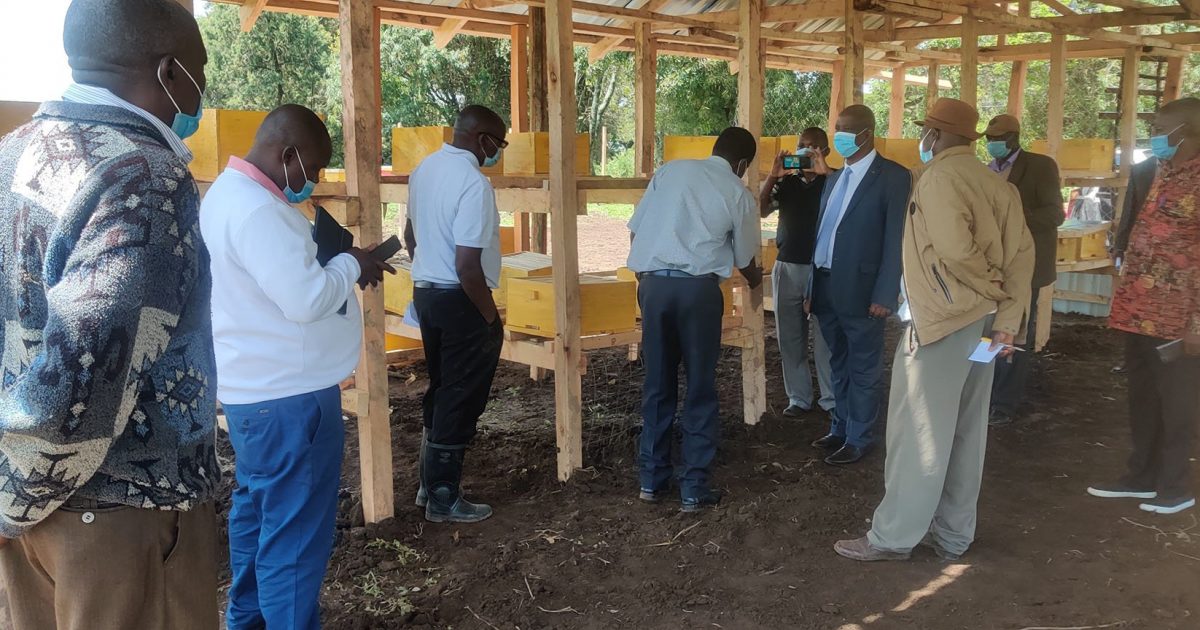Egerton University is currently working on a bee propagation project that will enable farmers buy mature queens to start their bee farms instead of waiting for the insects to colonize their hives.
The Queen Bee Rearing Technology (QBRT) being undertaken by the University’s Bee Research and Demonstration Unit (BRDU) at the Njoro Main Campus’ Agro-Science Park aims to increase the number of young queen bees per colony, hence raising the number of eggs laid in a hive to 1,000 to 2,000 per day.
Acting Deputy Vice Chancellor in charge of Research and Extension Professor Bockline Omedo Bebe says the initiative is part of the University’s bold action to protect and conserve bee colonies adding that bees and environment must be viewed through the lenses of food security.
“Although these insects are often associated with honey, pollination accounts for about one in every three bites of food. Bees are responsible for an estimated 80 per cent of pollination,” notes the Deputy Vice Chancellor.
Professor Bebe reiterates that bee colonies in Kenya are facing threats due to use of pesticides, land degradation and habitat loss. Climate change and deforestation have resulted in prolonged drought, which has led to reduction in folia for the honey-producing insects.
He explains that the technology involves selecting 10 hours-old bee larvae, which are moved to virgin queen bank where they are bred in compartments.
“Once they mature, they are taken to separate compartments, then mated and left to lay eggs,” he adds.
“Young queen bees bred at BRDU are being used to replace old queens and reduce the swarming impulse as well as exchange failing queens with vigorous ones to prevent a failed colony. The technology uses a moveable comb or a moveable frame hive so that the hive components can be moved in the way the beekeeper wishes to rear the new queens,” offers the Deputy Vice Chancellor.
Professor Bebe explains that though the life expectancy of a queen bee is 4-5 years, the mother bee is primarily productive in the first two years. BRDU he says is encouraging farmers to keep young queens for a constantly high production.
According to the Deputy Vice Chancellor, as the queen bee ages her laying capacity reduces drastically, which in turn hinders the attainment of the projected 60,000 bees per colony. The QBRT he notes is enabling beekeepers to get more queens from the Agro-Science Park which is being used to create small new colonies (or nucleus colonies) hence increasing the number of colonies and hives owned by farmers.
With the technology, the don points out farmers can also avoid variability in production, where many of them find one hive missing honey due to lack of a colony, while the others have so much.
The project, which is using the modern Langstroth hives, is projected to increase honey production in Kenya from the current 25,000 metric tons by bridging the deficit of 13,000 metric tons of honey per year.
“Currently, due to very few colonies, hive colonization in Kenya stands at between 20 – 50 percent, which is too low. This is because there are few queen bees available to lay the workers and drones which constitute 99 per cent of the bee colony,” states the Deputy Vice Chancellor.
Director of Agroscience Park Innovation Professor Paul Kimurto, says the main purpose of bees is pollination, but most of the people do not know that. Without bees, he warns the chances of cross-pollination dim drastically reducing food production.
“We tell farmers to grow sunflowers and avocados, which require pollination but we are not telling them how the crops will be pollinated. This is why we must address the pollination component,” adds Professor Kimurto who teaches at the University’s Faculty of Agriculture
The don who is also currently the Director of Marketing and Resource Mobilization at Egerton University states that honeybees are critical for the provision of ecosystem services which maintains wild plant communities and global agricultural production. Honey bee pollinators, through their mutualistic relationships with plants, he says are crucial for the reproductive success of several plant species in the natural environment.
“Roughly, 35 per cent of global crops, including fruits, vegetables, nuts, and other plants that provide food, fibre, drugs, and fuel for humans, are dependent on insect pollinators for reproduction. Economically, insect-pollinated crops have an annual worth of about 14.6 billion US dollars, of which 2-3 billion US dollars is contributed by wild bees. In addition, pollinators provide indirect benefits in the form of livestock forage such as alfalfa and clover. Pollinators also contribute to aesthetics, recreational values, and cultural activities, and help maintain ecosystem integrity,” Professor Kimurto elaborates.
Joel Masobo a lecturer at the University and a bee keeper says harmful pesticides affect the health of the bees by compromising their immunity, leading to their death and decline in population.
He notes that when pesticides are sprayed near hives, bees feel threatened and move out.
Masobo adds that some pesticides also tend to alter the DNA of the bees, kill them and also affect the ability of queen bees to forage consequently affecting the production of honey.
“When beehives are located next to crop farms which are sprayed often, the quality of the honey tends to be compromised. Most beekeepers have few options for saving their bees since most farmers have not embraced organic pesticides which are less harmful,” says the expert.
Mr Masobo advises crop farmers to spray their farms either very early in the morning between 5 and 6 am or in the evening to reduce the chances of the bees feeding on freshly sprayed flowers.
According to a report commissioned by the Route to Food Initiative (RTFI), 31 per cent of pesticides registered in Kenya are toxic to bees and other pollinators, a situation that threatens food security.
In its findings, RTFI states that a third of the registered pesticides in Kenya have been withdrawn from the European market, partly because of the toxicity and their long stay in the environment.
Use of these insecticides has been blamed for the 50 per cent decline of honeybee populations in the United States and the United Kingdom in the past 25 years” states the report.
The report dubbed “Pesticides in Kenya: Why our health, environment and food security are at stake” states that the state of affairs threatens the very basis of agriculture, given that wild bees and managed honeybees play the greatest role in pollinating crops.
According to estimates from the Food and Agriculture Organization of the United Nations (FAO), of 107 crop species, which provide 90 percent of global food, 71 percent are pollinated by bees. Some 20,000 species of bees responsible for fertilizing these food crops are staring at extinction.
“The importance of bees in the lives of humans is always underestimated and enough is not being done to protect the insects. While the world’s population is increasing day-by-day, the population of bees and other pollinators is steadily decreasing.” warns the report.
By Anne Mwale




